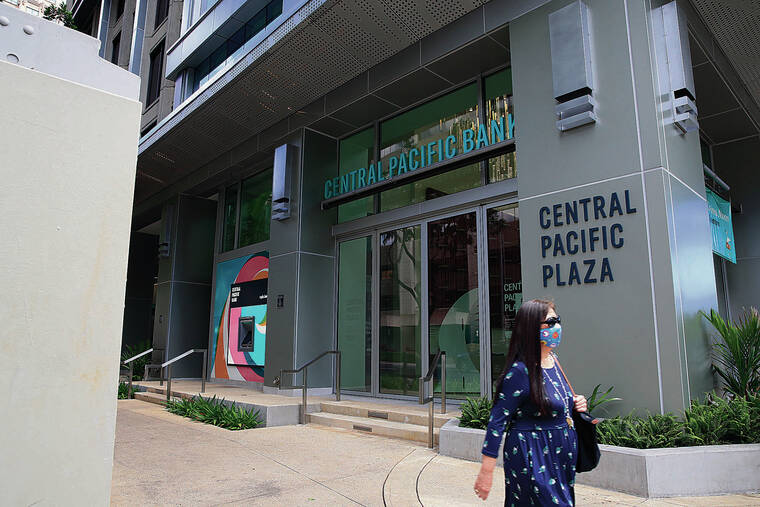Central Pacific Financial Corp. weathered what it called a “challenging operating environment” and said ahead of today’s earnings results that its deposits during the first quarter increased by $150 million from March 10 when Silicon Valley Bank, and then later Signature Bank, collapsed.
The holding company for the state’s fourth-largest bank was due to report that earnings fell 16.7% to $16.2 million, or 60 cents a share. But that still easily beat analysts’ consensus estimate of 55 cents. In the year-earlier quarter, Central Pacific earned $19.4 million, or 70 cents a share.
Central Pacific’s first-quarter results included $1.9 million that the bank set aside for potential loan losses, compared with a benefit of $3.2 million that it released from its reserve in the year-earlier quarter.
“We are pleased with our first quarter financial results, highlighted by stable deposit balances, continued solid asset quality and strong liquidity and capital positions,” Central Pacific President and CEO Arnold Martines said in a statement. “Despite the recent events affecting the national banking industry, Central Pacific Bank remains financially strong and committed to supporting our customers and community.”
Central Pacific said its deposits rose 2.2% to $6.75 billion from the year-earlier quarter and inched up 0.2%, or $10.7 million, from the fourth quarter. As of March 31 approximately 66% of the company’s deposits were insured by the Federal Deposit Insurance Corp. or fully collateralized.
Martines said in a phone interview that the bank hasn’t seen any unusual activity regarding its customer base, and stressed that the failure of Silicon Valley Bank and Signature Bank were unique situations.
“They had concentrations in certain industries as well as a high concentration in business versus consumer segments,” Martines said. “So for Silicon Valley Bank it’s the technology sector, and they basically bank that space. It’s a supermajority of their business. They had higher business deposits.
“In a bank there’s consumer and there’s business deposits, and they were much higher on the business product side, whereas Hawaii banks are much more balanced and much more granular. At Silicon Valley Bank their average deposit per customer was about $4.2 million. In Hawaii you’re looking at an average deposit per customer of $25,000 or less. … Also, (in Hawaii) these are long-term, relationship-based deposits. Hawaii banks are very, very different from what happened with Silicon Valley Bank and Signature Bank.”
Central Pacific’s loans rose 7.4% to $5.56 billion from the year-earlier quarter and edged up 0.03%, or $1.9 million, from the fourth quarter.
“Clearly, we’ve seen a moderation in the residential lending area given the increase in the market rates,” Martines said. “The good news, though, is if you look at the residential market, it’s still pretty robust. There’s low inventory and values are holding. At least near term, we’re going to see a moderation in volume and production. But we’re confident that as we work through this operating environment and we come out on the other side of this, there will still be a lot of opportunities for us to help people get into homes and to refi in the future.”
Central Pacific kept its quarterly dividend at 26 cents a share. It will be payable June 15 to shareholders of record at the close of business May 31. The bank also announced that in the first quarter it repurchased 101,760 shares at a total cost of $2.2 million, or an average cost per share of $21.67. However, the bank said it temporarily suspended share repurchases in March while market conditions continue to be evaluated.
“It’s the uncertainty of the operating environment and the potential recession,” Central Pacific Chief Financial Officer David Morimoto said. “It’s obviously a challenging operating environment. This is similar to other mainland banks. What our management team is focused on right now is strengthening our balance sheet to ensure that Central Pacific Bank is here for our customers and community during what could be a volatile period of time.”
Central Pacific’s net interest income, the spread between what the bank generates in loans and pays out for deposits, rose 6.4% to $54.2 million from the year-earlier quarter. The bank’s net interest margin rose 11 basis points to 3.08% from 2.97% in the year-earlier quarter but worsened by 9 basis points from the fourth quarter.
Noninterest income, which includes services charges and fees, increased 15.3% to $11 million from the year-earlier quarter.
The bank’s shares closed Tuesday down 81 cents at $15.21.
FIRST-QUARTER NET
$16.2 million
YEAR-EARLIER NET
$19.4 million

